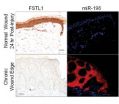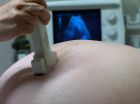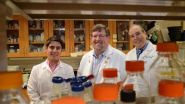(Press-News.org) CORAL GABLES, FL (March 8, 2013) -- University of Miami (UM) Psychologist Alexandra L. Quittner leads one of the largest, most nationally representative studies of the effects of parenting on very young, deaf children who have received cochlear implants. The findings indicate that mothers who are most sensitive in their interactions with their children receiving cochlear implants have kids that develop language faster, almost "catching up" to their hearing peers. The report is published in the Journal of Pediatrics.
"I was surprised that maternal sensitivity had such strong and consistent effects on oral language learning," says Quittner, director, Child Division in the Department of Psychology, at the UM College of Arts and Sciences. "The findings indicate that pediatric cochlear implant programs should offer parent training that facilitates a more positive parent-child relationship and fosters the child's development of autonomy and positive regard."
The goal of the study was to understand the role of parental behavior in language growth for deaf children. Maternal sensitivity was measured in videotaped interactions with the child and defined by warmth, as the degree to which a mother expressed positive regard and emotional support of the child.
Participants were 188 children with severe to profound loss of hearing, ages from five months to five years. In addition to analyzing the effects of maternal sensitivity, on language development, the study also looks at the impact of cognitive and language stimulation. Parent-child interactions observed and coded included free play, puzzle solving, and an art gallery task with five posters mounted at different heights on the walls of the playroom.
The largest improvements in language development were observed in children whose parents displayed high sensitivity; Language stimulation was also an important predictor of language gains, but was most effective when delivered in a sensitive manner. Deaf children with sensitive parents had only a 1 year delay in oral language compared to. 2.5 years among those with less sensitive parents.
This cohort of deaf and hearing children has now been followed for approximately 8 years post-implantation; NIH has just funded the competitive renewal, allowing the researchers to follow them for another 5 years, into adolescence. The aims will focus on their cognitive and social development, as well as their academic achievement.
###
Contributors include the UM Cochlear Implant Team, including the Director of the Barton G Kids Hear Now Program, Ivette Cejas, assistant professor, Department of Otolaryngology; David Barker, assistant professor at Brown University; John Niparko, Chair, Department of Otolaryngology University of Southern California (USC); Laurie Eisenberg clinical professor at USC and House Ear Institute and Emily Tobey professor, University of Texas in Dallas.
About the University of Miami
The University of Miami's mission is to educate and nurture students, to create knowledge, and to provide service to our community and beyond. Committed to excellence and proud of our diversity of our University family, we strive to develop future leaders of our nation and the world. http://www.miami.edu. END
Mom's sensitivity helps language development in children with hearing loss
University of Miami psychologist and her collaborators demonstrate the impact sensitive parenting has on language growth for children who receive cochlear implants
2013-03-08
ELSE PRESS RELEASES FROM THIS DATE:
BRAF inhibitor treatment causes melanoma cells to shift how they produce energy
2013-03-08
A multi-institutional study has revealed that BRAF-positive metastatic malignant melanomas develop resistance to treatment with drugs targeting the BRAF/MEK growth pathway through a major change in metabolism. The findings, which will be published in Cancer Cell and have been released online, suggest a strategy to improve the effectiveness of currently available targeted therapies.
"We were surprised to find that melanoma cells treated with the BRAF inhibitor vemurafenib dramatically change the way they produce energy to stay alive," says David E. Fisher, MD, PhD, chief ...
A*STAR scientists discover 'switch' critical to wound healing
2013-03-08
Patients with diseases such as diabetes suffer from painful wounds that take a long time to heal making them more susceptible to infections that could even lead to amputations. A*STAR's discovery paves the way for therapeutics to improve healing of such chronic wounds, which are a significant burden to patients.
1. Scientists from A*STAR's Institute of Medical Biology (IMB) have identified a molecular "switch" that controls the migration of skin cells necessary for wounds to close and heal. This is especially significant for diabetics and other patients who suffer from ...
Stanford scientists calculate the carbon footprint of grid-scale battery technologies
2013-03-08
Americans take electrical power for granted whenever they flip on a light switch. But the growing use of solar and wind power in the United States makes the on-demand delivery of electricity more challenging.
A key problem is that the U.S. electrical grid has virtually no storage capacity, so grid operators can't stockpile surplus clean energy and deliver it at night, or when the wind isn't blowing.
To provide more flexibility in managing the grid, researchers have begun developing new batteries and other large-scale storage devices. But the fossil fuel required to ...
Home toxic home
2013-03-08
EAST LANSING, Mich. — Most organisms would die in the volcanic sulfur pools of Yellowstone and Mount Etna. Robust simple algae call it home, and their secrets to survival could advance human medicine and bioremediation.
Mike Garavito, Michigan State University professor of biochemistry and molecular biology was part of a research team that revealed how primitive red algae use horizontal gene transfer, in essence stealing useful genes from other organisms to evolve and thrive in harsh environments.
Their study, published in the current issue of Science, shows that the ...
Anti-aging drug breakthrough
2013-03-08
Drugs that combat ageing may be available within five years, following landmark work led by an Australian researcher.
The work, published in the March 8 issue of Science, finally proves that a single anti-ageing enzyme in the body can be targeted, with the potential to prevent age-related diseases and extend lifespans.
The paper shows all of the 117 drugs tested work on the single enzyme through a common mechanism. This means that a whole new class of anti-ageing drugs is now viable, which could ultimately prevent cancer, Alzheimer's disease and type 2 diabetes.
"Ultimately, ...
Virus and genes involved in causation of schizophrenia
2013-03-08
Viruses and genes interact in a way that may increase the risk of developing schizophrenia significantly. This happens already in the developing foetus.
An international team of scientists led by Aarhus University, Denmark, has made this discovery. As the first in the world, they scanned the entire genome of hundreds of sick and healthy people to see if there is an interaction between genes and a very common virus - cytomegalovirus - and to see whether the interaction influences the risk of developing schizophrenia.
And it does.
Women that have been infected by the virus ...
Specialised germanium surface as universal protein adapter
2013-03-08
Researchers at the Ruhr Universität Bochum have developed a new method for attaching proteins to the surface of germanium crystals – for the first time also membrane proteins. This enables time-resolved tracking of the interactions between molecules using infrared spectroscopy in a way that is accurate down to atomic resolution. The method is applied in the EU project "Kinetics for Drug Discovery, K4DD", in which scientists explore the interplay of drugs and their interaction partners. With the new technology, the researchers can also study so-called G-protein-coupled receptors, ...
Maternal obesity increases the risk of frequent wheezing in offspring
2013-03-08
The fact that excess weight during pregnancy has negative consequences is not new information. A new study now concludes that the children of mothers obese before falling pregnant are four times more likely to have frequent wheezing, which is one of the symptoms of asthma, compared to the children of mothers weighing a normal weight.
Researchers from the Centre for Research in Environmental Epidemiology (CREAL) assessed whether obesity in mothers increases the risk of their children having frequent wheezing, a symptom associated with susceptibility to asthma during infancy ...
Signaling molecule may help stem cells focus on making bone despite age, disease
2013-03-08
AUGUSTA, Ga. – A signaling molecule that helps stem cells survive in the naturally low-oxygen environment inside the bone marrow may hold clues to helping the cells survive when the going gets worse with age and disease, researchers report.
They hope the findings, reported in PLOS ONE, will result in better therapies to prevent bone loss in aging and enhance success of stem cell transplants for a wide variety of conditions from heart disease to cerebral palsy and cancer.
They've found that inside the usual, oxygen-poor niche of mesenchymal stem cells, stromal cell-derived ...
Scientists discuss relationship between abortion and violence against women
2013-03-08
This press release is available in Spanish.
New York, March 8th 2013 – Scientists of the United States of America, Ireland, and Chile met this week in New York to discuss recent scientific evidence regarding abortion as a form of growing violence against women and girls. Indiscriminate practice of abortion is significantly correlated with coercion, a history of sexual abuse, violence during pregnancy, intimate partner violence, and with psychological consequences that may lead to suicide.
The scientific evidence was discussed by Doctors Monique Chireau (North Carolina, ...
LAST 30 PRESS RELEASES:
Don’t Panic: ‘Humanity’s Last Exam’ has begun
A robust new telecom qubit in silicon
Vertebrate paleontology has a numbers problem. Computer vision can help
Reinforced enzyme expression drives high production of durable lactate-based polyester
In Rett syndrome, leaky brain blood vessels traced to microRNA
Scientists sharpen genetic maps to help pinpoint DNA changes that influence human health traits and disease risk
AI, monkey brains, and the virtue of small thinking
Firearm mortality and equitable access to trauma care in Chicago
Worldwide radiation dose in coronary artery disease diagnostic imaging
Heat and pregnancy
Superagers’ brains have a ‘resilience signature,’ and it’s all about neuron growth
New research sheds light on why eczema so often begins in childhood
Small models, big insights into vision
Finding new ways to kill bacteria
An endangered natural pharmacy hidden in coral reefs
The Frontiers of Knowledge Award goes to Charles Manski for incorporating uncertainty into economic research and its application to public policy analysis
Walter Koroshetz joins Dana Foundation as senior advisor
Next-generation CAR-T designs that could transform cancer treatment
As health care goes digital, patients are being left behind
A clinicopathologic analysis of 740 endometrial polyps: risk of premalignant changes and malignancy
Gibson Oncology, NIH to begin Phase 2 trials of LMP744 for treatment of first-time recurrent glioblastoma
Researchers develop a high-efficiency photocatalyst using iron instead of rare metals
Study finds no evidence of persistent tick-borne infection in people who link chronic illness to ticks
New system tracks blockchain money laundering faster and more accurately
In vitro antibacterial activity of crude extracts from Tithonia diversifolia (asteraceae) and Solanum torvum (solanaceae) against selected shigella species
Qiliang (Andy) Ding, PhD, named recipient of the 2026 ACMG Foundation Rising Scholar Trainee Award
Heat-free gas sensing: LED-driven electronic nose technology enhances multi-gas detection
Women more likely to choose wine from female winemakers
E-waste chemicals are appearing in dolphins and porpoises
Researchers warn: opioids aren’t effective for many acute pain conditions
[Press-News.org] Mom's sensitivity helps language development in children with hearing lossUniversity of Miami psychologist and her collaborators demonstrate the impact sensitive parenting has on language growth for children who receive cochlear implants




